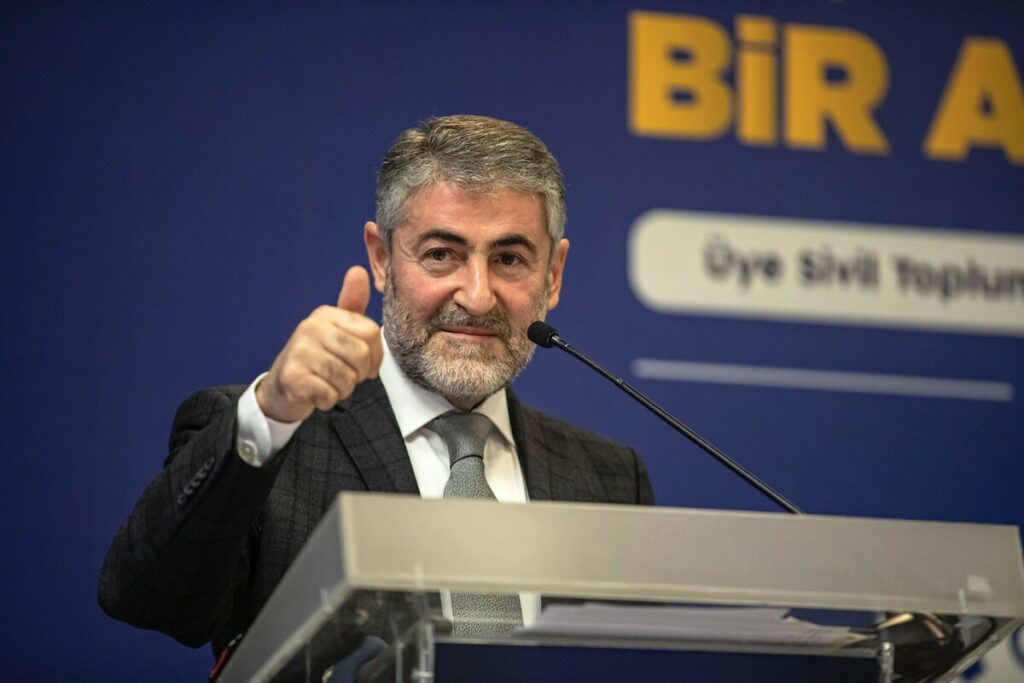The source for mystery capital flows into Turkey that have recently been brought to public attention by prominent international publications is the country’s economic model, the finance minister has said.
In two analyses published by Bloomberg and Financial Times this week, the news outlets questioned an unexplained cash flow of $24.4 billion into Turkey at a time when the latest figures from the Turkish central bank show the country’s current account deficit continuing to widen in July, bringing the total shortfall this year to $36.7 billion.
Minister Nureddin Nebati on Thursday answered a question posed by the Financial Times from his Twitter account by linking its article published on Tuesday. In response to FT’s question of “Who’s stuffing Turkey?” he said: “Türkiye Economy Model Investment: Production, Employment, Exports, Growth.”
Yatırımı ve üretimi teşvik eden ekonomi politikamız büyümeyi ve vergi gelirlerinde artışı beraberinde getiriyor. Harcamalarda ortaya koyduğumuz ihtiyatlı duruş da kamu maliyesinde birçok gelişmiş ülkeden daha iyi performans göstermemizi sağlıyor.
— Dr.Nureddin NEBATİ
(@NureddinNebati) September 15, 2022
Nebati said Turkey’s economic policy, which promotes investment and production, brings along growth and an increase in tax revenue. He said Turkey would continue on this path without making any concessions to fiscal discipline.
Bloomberg and FT, however, have raised other possibilities as the source of the unexplained cash flow.
FT said these discrepancies (aka net errors and omissions, or NEO) can be often sorted once foreign counterparts clean up their own data. But these are some seriously large numbers — by comparison, the total for the same period last year was just $10.2 billion.
According to Bloomberg, tourism income alone can’t explain the numbers, either, as revenue from vacationers was $4.5 billion in July, bringing the January-to-July tally to $16.4 billion.
“That’s around 70 percent of the net errors and omissions during the same period,” said the report.
Liam Peach from Capital Economics told FT that the NEO component of the balance of payments (BOP) could be the result of several things but that any details about it are not known for sure. Peach said it could be the result of mis-recorded capital flows, could reflect anything from the selling of gold and the deposit of FX to the mis-recording of services trade or smuggling.
“It’s difficult to know exactly what is going on, but it’s clear that this has provided a key support to the current account deficit this year, and if these unexplained flows reverse it would put the spotlight back on Turkey’s low reserve coverage,” Peach said.
Timothy Ash from BlueBay Asset Management pointed to a possible Russian influence, saying Turkish banks may be quite happy to accept money moving out of Russia, which currently faces international sanctions due to its ongoing war against Ukraine.
The deficit in Turkey’s current account has been on the rise since Russia’s invasion of Ukraine in February spurred a rally in energy prices. The gap was just over $4 billion in July, exceeding the median estimate of $3.7 billion in a Bloomberg survey and taking this year’s shortfall to $36.7 billion.
The mystery inflows have helped the central bank keep the lira relatively stable since the start of the year, after it lost more than half its value in a months-long slump in 2021.
The Turkish economy went into a tailspin since last year when President Recep Tayyip Erdoğan — who is up for re-election next year — put pressure on the central bank to start slashing interest rates.
Contrary to economic orthodoxy, Erdoğan is convinced that high interest rates fuel inflation rather than rein it in. Yet, the central bank’s failure to increase the interest rates led the country’s inflation to reach a record level of more than 80 percent in August, the highest over the past 24 years. Unofficial estimates show the inflation level twice higher.
The lira, which has lost more than half its value against the dollar in the past year alone and has been the worst performer in emerging markets for several years running due largely to economic and monetary policy concerns under Erdoğan’s government, traded at 18.25 to the US dollar on Thursday, down more than 27 percent so far this year.



